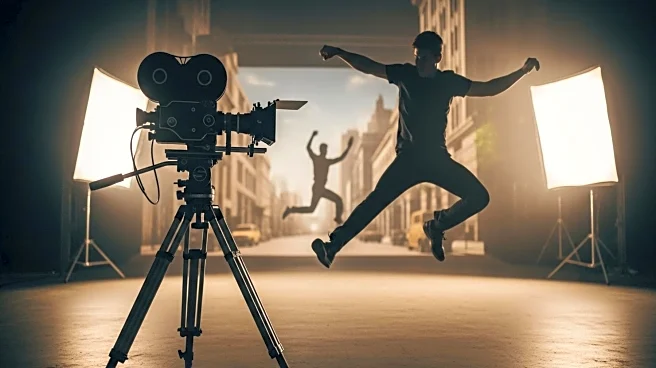What is the story about?
What's Happening?
Austin Butler, known for his role as Tex Watson in Quentin Tarantino's film 'Once Upon a Time in Hollywood,' shared insights into the filming of a pivotal fight scene with Brad Pitt's character, Cliff Booth. The movie, set in the late 1960s, presents an alternate history where the infamous Manson Family's attack is thwarted by fictional characters. Butler revealed that the fight scene was initially planned to be longer, but Tarantino decided it should be brief, reflecting Booth's special forces background. The scene involved intense physical challenges, including Butler's interaction with a pitbull, which led to a torn rotator cuff during rehearsals.
Why It's Important?
The film 'Once Upon a Time in Hollywood' is significant for its creative reinterpretation of historical events, showcasing Tarantino's unique storytelling style. Butler's experiences highlight the physical demands and risks involved in performing stunts, emphasizing the dedication required by actors in action-heavy roles. This insight into the filmmaking process underscores the importance of safety and preparation in the industry, potentially influencing future stunt coordination practices. The film's portrayal of historical figures and events also contributes to ongoing discussions about the representation of real-life stories in cinema.
What's Next?
While the film has already been released, Butler's revelations may spark further interest in behind-the-scenes aspects of filmmaking, particularly in action sequences. Fans and industry professionals might look forward to more detailed accounts from actors involved in similar projects, potentially leading to increased transparency and appreciation for the craft. Additionally, Tarantino's approach to storytelling may inspire other filmmakers to explore alternate histories, impacting future cinematic narratives.
Beyond the Headlines
The ethical implications of altering historical events in films like 'Once Upon a Time in Hollywood' can provoke discussions about artistic license and its effects on public perception of history. Such narratives may influence cultural understanding and memory, raising questions about the balance between creative expression and historical accuracy. This could lead to broader debates within the film industry and among audiences regarding the portrayal of sensitive historical topics.
















